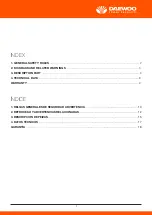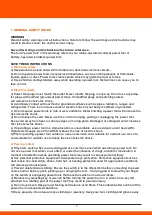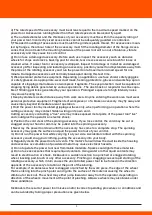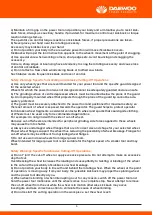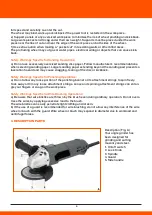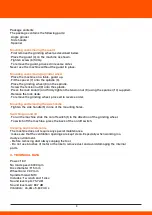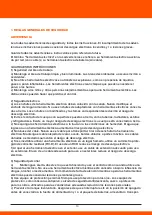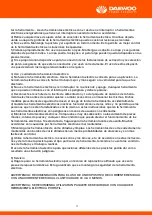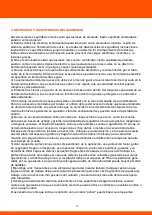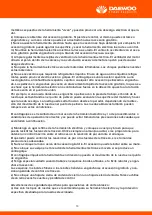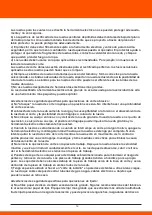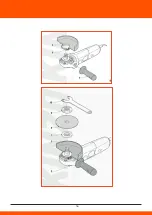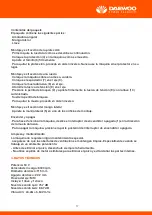
2
1.
GENERAL SAFETY RULES
WARNING
Read all safety warnings and all instructions. Failure to follow the warnings and instructions may
result in electric shock, fire and/or serious injury.
Save all warnings and instructions for future reference.
The term "power tool" in the warnings refers to your mains-operated (corded) power tool or
battery-operated (cordless) power tool.
SAVE THESE INSTRUCTIONS
1) Work area safety
a) Keep work area clean and well lit. Cluttered or dark areas invite accidents.
b) Do not operate power tools in explosive atmospheres, such as in the presence of flammable
liquids, gases or dust. Power tools create sparks which may ignite the dust or fumes.
c) Keep children and bystanders away while operating a power tool. Distractions can cause you to
lose control.
2) Electrical safety
a) Power tool plugs must match the outlet. Never modify the plug in any way. Do not use any adap-
ter plugs with earthed (grounded) power tools. Unmodified plugs and matching outlets
will reduce risk of electric shock.
b) Avoid body contact with earthed or grounded surfaces such as pipes, radiators, ranges and
refrigerators. There is an increased risk of electric shock if your body is earthed or grounded.
c) Do not expose power tools to rain or wet conditions. Water entering a power tool will increase the
risk of electric shock.
d) Do not abuse the cord. Never use the cord for carrying, pulling or unplugging the power tool.
Keep cord away from heat, oil, sharp edges or moving parts. Damaged or entangled cords increase
the risk of electric shock.
e) If operating a power tool in a damp location is unavoidable, use a residual current device(RC-
D)protected supply. Use of and RCD reduces the risk of electric shock.
f) When operating a power tool outdoors, use an extension cord suitable for outdoor use. Use of a
cord suitable for outdoor use reduces the risk of electric shock.
3) Personal safety
a) Stay alert, watch what you are doing and use common sense when operating a power tool. Do
not use a power tool while you are tired or under the influence of drugs, alcohol or medication. A
moment of inattention while operating power tools may result in serious personal injury.
b) Use personal protective equipment. Always wear eye protection. Protective equipment such as
dust mask, non-skid safety shoes, hard hat, or hearing protection used for appropriate conditions
will reduce personal injuries.
c) Prevent unintentional starting. Ensure the switch is in the offposition before connecting to power
source and/or battery pack, picking up or carrying the tool. . Carrying power tools with your finger
on the switch or energising power tools that have the switch on invite accidents.
d) Remove any adjusting key or wrench before turning the power tool on. A wrench or a key left
attached to a rotating part of the power tool may result in personal injury.
e) Do not overreach. Keep proper footing and balance at all times. This enables better control of the
power tool in unexpected situations.
f) Dress properly. Do not wear loose clothing or jewellery. Keep your hair, clothing and gloves away
from moving parts. Loose clothes, jewellery or long hair can be caught in moving parts.
g) If devices are provided for the connection of dust extraction and collection facilities, ensure these
are connected and properly used. Use of these devices can reduce dust related hazards.
4) Power tool use and care
a) Do not force the power tool. Use the correct power tool for your application. The correct power
tool will do the job better and safer at the rate for which it was designed.
b) Do not use the power tool if the switch does not turn it on and off. Any power tool that cannot be
controlled with the switch is dangerous and must be repaired.
c) Disconnect the plug from the power source and/or the battery pack from the power tool before
making any adjustments, changing accessories, or storing power tools. Such preventive safety
measures reduce the risk of starting the power tool accidentally.
d) Store idle power tools out of reach of children and do not allow persons unfamiliar with the power
tool or these instructions to operate the power tool. Power tools are dangerous in the hands of
untrained users.
e) Maintain power tools. Check for misalignment or binding of moving parts, breakage of parts and
any other condition that may affect the power tools operation. If damaged, have the power tool
repaired before use. Many accidents are caused by poorly maintained power tools.
f) Keep cutting tools sharp and clean. Properly maintained cutting tools with sharp cutting edges
are less likely to bind and are easier to control.
g) Use the power tool, accessories and tool bits etc. in accordance with these instructions and in
the manner intended for the particular type of power tool, taking into account the working condi-
tions and the work to be performed.
Use of the power tool for operations different from those intended could result in a hazardous
situation.
5) Service
a) Have your power tool serviced by a qualified repair person using only identical replacement parts.
This will ensure that the safety of the power tool is maintained.
WARNING: RECOMMENDATION FOR THE USE OF A RESIDUAL CURRENT DEVICE WITH A RATED
RESIDUAL CURRENT OF 30 mA OR LESS.
WARNING: IT IS RECOMMENDED THAT A SAFETY PACK IS USED WITH ANY PORTABLE POWER
TOOL.
2. KICKBACK AND RELATED WARNINGS
Safety Warnings Common for Grinding, Sanding, Wire Brushing, Polishing or Abrasive
Cutting-Off Operations:
a) This power tool is intended to function as a grinder, sander, wire brush, polisher or cut-off tool.
Read all safety warnings, instructions, illustrations and specifications provided with this power tool.
Failure to follow all instructions listed below may result in electric shock, fire and/or serious injury.
b) Operations such as grinding, sanding, wire brushing, polishing or cutting-off are not recommen-
ded to be performed with this power tool. Operations for which the power
tool was not designed may create a hazard and cause personal injury.
c) Do not use accessories which are not specifically designed and recommended by the tool manu-
facturer. Just because the accessory can be attached to your power tool, it does not assure safe
operation.
d) The rated speed of the accessory must be at least equal to the maximum speed marked on the
power tool. Accessories running faster than their rated speed can break and fly apart.
e) The outside diameter and the thickness of your accessory must be within the capacity rating of
your power tool. Incorrectly sized accessories cannot be adequately guarded or controlled.
f) Threaded mounting of accessories must match the grinder spindle thread. For accessories moun-
ted by flanges, the arbour hole of the accessory must fit the locating diameter of the flange. Acces-
sories that do not match the mounting hardware of the power tool will run out of balance, vibrate
excessively and may cause loss of control.
g) Do not use a damaged accessory. Before each use inspect the accessory such as abrasive
wheels for chips and cracks, backing pad for cracks, tear or excess wear, wire brush for loose or
cracked wires. If power tool or accessory is dropped, inspect for damage or install an undamaged
accessory. After inspecting and installing an accessory, position yourself and bystanders away from
the plane of the rotating accessory and run the power tool at maximum no-load speed for one
minute. Damaged accessories will normally break apart during this test time.
h) Wear personal protective equipment. Depending on application, use face shield, safety goggles
or safety glasses. As appropriate, wear dust mask, hearing protectors, gloves and workshop apron
capable of stopping small abrasive or workpiece fragments. The eye protection must be capable of
stopping flying debris generated by various operations . The dust mask or respirator must be capa-
ble of filtrating particles generated by your operation. Prolonged exposure to high intensity noise
may cause hearing loss.
i) Keep bystanders a safe distance away from work area. Anyone entering the work area must wear
personal protective equipment. Fragments of workpiece or of a broken accessory may fly away and
cause injury beyond immediate area of operation.
j) Hold the power tool by insulated gripping surfaces only, when performing an operation where the
cutting accessory may contact hidden wiring or its own cord.
Cutting accessory contacting a "live" wire may make exposed metal parts of the power tool "live"
and could give the operator an electric shock.
k) Position the cord clear of the spinning accessory. If you lose control, the cord may be cut or
snagged and your hand or arm may be pulled into the spinning accessory.
l) Never lay the power tool down until the accessory has come to a complete stop. The spinning
accessory may grab the surface and pull the power tool out of your control.
m) Do not run the power tool while carrying it at your side. Accidental contact with the spinning
accessory could snag your clothing, pulling the accessory into your body.
n) Regularly clean the power tool’s air vents. The motor’s fan will draw the dust inside the housing
and excessive accumulation of powdered metal may cause electrical hazards.
o) Do not operate the power tool near flammable materials. Sparks could ignite these materials.
p) Do not use accessories that require liquid coolants. Using water or other liquid coolants may
result in electrocution or shock. Kickback is a sudden reaction to a pinched or snagged rotating
wheel, backing pad, brush or any other accessory. Pinching or snagging causes rapid stalling of the
rotating accessory, which in turn causes the uncontrolled power tool to be forced in the direction
opposite of the accessory’s rotation at the point of the binding.
For example, if an abrasive wheel is snagged or pinched by the work piece, the edge of the wheel
that is entering into the pinch point can dig into the surface of the material causing the wheel to
climb out or kick out. The wheel may either jump toward or away from the operator, depending on
direction of the wheel’s movement at the point of pinching. Abrasive wheels may also break under
these conditions.
Kickback is the result of power tool misuse and/or incorrect operating procedures or conditions and
can be avoided by taking proper precautions as given below.
a) Maintain a firm grip on the power tool and position your body and arm toallow you to resist kick-
back forces. Always use auxiliary handle, if provided, for maximum control over kickback or torque
reaction during start-up.
The operator can control torque reactions or kickback forces, if proper precautions are taken.
b) Never place your hand near the rotating accessory.
Accessory may kickback over your hand.
c) Do not position your body in the area where power tool will move if kickback occurs.
Kickback will propel the tool in direction opposite to the wheel’s movement at the point of snagging.
d) Use special care when working corners, sharp edges etc. Avoid bouncing and snagging the
accessory.
Corners, sharp edges or bouncing have a tendency to snag the rotating accessory and cause loss
of control or kickback.
e) Do not attach a Saw chain woodcarving blade or toothed saw blade.
Such blades create frequent kickback and loss of control.
Safety Warnings Specific for Grinding and Abrasive Cutting-Off Operations:
a) Use only wheel types that are recommended for your power tool and the specific guard designed
for the selected wheel.
Wheels for which the power tool was not designed cannot be adequately guarded and are unsafe.
b) The grinding surface of centre depressed wheels must be mounted below the plane of the guard
lip. An improperly mounted wheel that projects through the plane of the guard lip cannot be ade-
quately protected.
c) The guard must be securely attached to the power tool and positioned for maximum safety, so
the least amount of wheel is exposed towards the operator. The guard helps to protect operator
from broken wheel fragments, accidental contact with wheel and sparks that could ignite clothing.
d) Wheels must be used only for recommended applications.
For example: do not grind with the side of cut-off wheel.
Abrasive cut-off wheels are intended for peripheral grinding, side forces applied to these wheels
may cause them to shatter.
e) Always use undamaged wheel flanges that are of correct size and shape for your selected wheel.
Proper wheel flanges support the wheel thus reducing the possibility of wheel breakage. Flanges for
cut-off wheels may be different from grinding wheel flanges.
f) Do not use worn down wheels from larger power tools.
Wheel intended for larger power tool is not suitable for the higher speed of a smaller tool and may
burst.
Safety Warnings Specific for Abrasive Cutting-Off Operations:
a) Do not “jam” the cut-off wheel or apply excessive pressure. Do not attempt to make an excessive
depth of cut.
Overstressing the wheel increases the loading and susceptibility to twisting or binding of the wheel
in the cut and the possibility of kickback or wheel breakage.
b) Do not position your body in line with and behind the rotating wheel. When the wheel, at the point
of operation, is moving away from your body, the possible kickback may propel the spinning wheel
and the power tool directly at you.
c) When wheel is binding or when interrupting a cut for any reason, switch off the power tool and
hold the power tool motionless until the wheel comes to a complete stop. Never attempt to remove
the cut-off wheel from the cut while the wheel is in motion otherwise kickback may occur.
Investigate and take corrective action to eliminate the cause of wheel binding.
d) Do not restart the cutting operation in the work piece. Let the wheel reach
full speed and carefully re-enter the cut.
The wheel may bind, walk up or kickback if the power tool is restarted in the work piece.
e) Support panels or any oversized work piece to minimize the risk of wheel pinching and kickback.
Large work pieces tend to sag under their own weight. Supports must be placed under the work
piece near the line of cut and near the edge of the work piece on both sides of the wheel.
f) Use extra caution when making a “pocket cut” into existing walls or other blind areas.
The protruding wheel may cut gas or water pipes, electrical wiring or objects that can cause kick-
back.
Safety Warnings Specific for Sanding Operations:
a) Do not use excessively oversized sanding disc paper. Follow manufacturer’s recommendations,
when selecting sanding paper. Larger sanding paper extending beyond the sanding pad presents a
laceration hazard and may cause snagging, tearing of the disc or kickback.
Safety Warnings Specific for Polishing Operations:
a) Do not allow any loose portion of the polishing bonnet or its attachment strings to spin freely.
Tuck away or trim any loose attachment strings. Loose and spinning attachment strings can entan-
gle your fingers or snag on the work piece.
Safety Warnings Specific for Wire Brushing Operations:
a) Be aware that wire bristles are thrown by the brush even during ordinary operation. Do not overs-
tress the wires by applying excessive load to the brush.
The wire bristles can easily penetrate light clothing and/or skin.
b) If the use of a guard is recommended for wire brushing, do not allow any interference of the wire
wheel or brush with the guard. Wire wheel or brush may expand in diameter due to workload and
centrifugal forces.
3. DESCRIPTION PARTS


